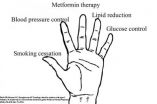(Press-News.org) The increased demand for primary care services expected to result from the Affordable Care Act (ACA) may be felt strongly in rural areas. While studies have found that the quality of care delivered to rural patients is as good or better than that available in urban areas, the belief persists that top-quality primary care is only available in big cities. But a new study appearing in the National Rural Health Association's Journal of Rural Health finds few meaningful differences between rural and urban primary care physicians on key measures of professionalism, including their attitudes about participation in quality care improvement. The study did find differences in the likelihood of physicians' knowing a colleague who was impaired or incompetent, in their confidence evaluating new information and in several aspects of their interactions with patients.
"In terms of professional beliefs and behaviors, we found that rural and urban doctors are more alike than they are different," says study leader Eric G. Campbell, PhD, director of Research at the Mongan Institute for Health Policy at Massachusetts General Hospital (MGH) and professor of Medicine at Harvard Medical School. "Despite our results and other evidence, the perception still exists that rural primary care is not as good as that available in cities. So we needed to learn more about the factors driving that misperception and the role it may play in the continuing shortage of rural physicians in the U.S."
Campbell and his co-authors note that, while smaller rural communities may have disadvantages in terms of fewer training options, rural primary-care physicians are significantly more likely to participate in activities such as quality improvement in their practices and hospitals. The fact that rural physicians are more likely to have personal as well as professional relationships with their patients may give them a better sense of environmental and lifestyle factors that affect patients' health but also could lead to challenges when professional responsibilities conflict with patient expectations and perceptions.
This study was designed to determine whether there were significant differences between primary care rural and urban physicians in terms of professional beliefs and in their interest and participation in quality improvement activities. The survey was sent to almost 3,000 practicing physicians randomly selected from an American Medical Association database, almost 2,000 of whom responded. The current report analyzes responses from 840 family practitioners, internists or general pediatricians. Based on ZIP code information, 127 respondents practiced in rural communities, while the other 713 were from urban areas.
There were no significant differences between rural and urban physicians' attitudes regarding participation in quality improvement activities and the importance of open communication with patients, including reporting any errors in their care. Rural physicians were more likely to participate in error-reduction initiatives, in reviews of other physicians' records, and to feel prepared to contribute to quality improvement efforts. They also were more likely to agree that physicians should discuss the costs of care with their patients and to report having added Medicaid or uninsured patients to their patient panels during the preceding year.
"Rural physicians are dedicated to providing high-quality care and committed to supporting safety-net patients," says Anne Kirchhoff, PhD, MPH, corresponding author and an assistant professor of Pediatrics at the University of Utah. "The Affordable Care Act should help more rural primary care providers receive payments for care they currently provide without charge. But as the Medicaid expansion is limited to only half the states, many rural providers will still shoulder a disproportionate cost burden compared with urban physicians."
Although both urban and rural physicians agreed on the importance of reporting colleagues who were incompetent or in some way impaired, rural physicians were significantly more likely to indicate actually knowing about such individuals. Similar percentages of both rural and urban doctors felt prepared to deal with impaired or incompetent colleagues. Rural physicians were more likely to report having fulfilled patient requests for brand-name drugs when less expensive generics were available – a common measure of wasteful medical practice – and were less likely to feel prepared to evaluate new medical information.
"Our findings suggest a deep and broad agreement among primary care physicians on the key tenets of medical professionalism, regardless of the location of their practices," says Campbell. "However we are concerned that, while rural physicians are more likely to know an impaired physician, most of them do not feel prepared to deal with such colleagues. Although rural physicians were more likely to talk to their patients about the costs of their care, they may not be as drug-cost-conscious as they could be. And many don't feel prepared to evaluate new clinical information. We need to further explore the implications of these findings, particular since a significant number of the patients enrolling in new ACA-sponsored health plans will be from rural areas."
INFORMATION:
Gary Hart, PhD, director and professor at the Center for Rural Health, University of North Dakota School of Medicine and Health Sciences, is also a co-author of the Journal of Rural Health report. The study was supported by a grant from the Institute on Medicine as a Profession at Columbia University.
Massachusetts General Hospital, founded in 1811, is the original and largest teaching hospital of Harvard Medical School. The MGH conducts the largest hospital-based research program in the United States, with an annual research budget of more than $775 million and major research centers in AIDS, cardiovascular research, cancer, computational and integrative biology, cutaneous biology, human genetics, medical imaging, neurodegenerative disorders, regenerative medicine, reproductive biology, systems biology, transplantation biology and photomedicine.
Rural primary care physicians are committed to professionalism, quality improvement
Rural physicians more likely than urban counterparts to discuss costs of care with patients, to participate in quality improvement activities
2014-02-20
ELSE PRESS RELEASES FROM THIS DATE:
Study examines correctional officer stress
2014-02-20
HUNTSVILLE, TX (2/20/14) -- Conflicts between work and family life were the most significant issues that affect work stress and job satisfaction among correctional officers, a new study by the Correctional Management Institute of Texas at Sam Houston State University found.
In a study of 441 correctional officers from adult prisons in the South, the most significant work-home issues experienced by correctional officers were demands and tensions from work that impact their home life; an incompatibility between the officer's role at work and at home; and family circumstances ...
Meet your match: Using algorithms to spark collaboration between scientists
2014-02-20
Speed dating, in which potential lovers size each other up in brief 10 minute encounters before moving on to the next person, can be an awkward and time-wasting affair. Finding the perfect research partnership is often just as tough. Speed dating-style techniques are increasingly used at academics conferences, but can be equally frustrating - with busy academics being pushed into too many pointless encounters.
But now a group of scientists led by geneticist Rafael Carazo Salas have constructed a system that could revolutionise conference speed dating - by treating scientists ...
Editorial illustrates shift away from glycemic control in diabetes treatment
2014-02-20
BOSTON (February 20, 2014)—An editorial in a February issue of American Family Physician proposes a simple way for physicians to communicate with patients about the best treatments for diabetes. The "lending a hand" illustration reprioritizes treatment goals, based on research on mortality reduction, to convey that glycemic control is no longer the primary intervention.
In order of benefit, to improve length and quality of life, patients with type 2 diabetes benefit from these interventions, starting with smoking cessation:
"Glycemic control is stuck in people's minds ...
Why are some children more resilient to post-traumatic stress?
2014-02-20
New Rochelle, NY, February 20, 2014—Children exhibit a range of responses to traumatic events such as natural disasters, with some suffering acute traumatic reactions that resolve over time and others experiencing long-term symptoms of post-traumatic stress. Identifying factors that may help predict which youths are at greater risk of more serious disorders and which are likely to be more resilient following a traumatic event can help determine the care and services needed, according to an article in Journal of Child and Adolescent Psychopharmacology (JCAP), a peer-reviewed ...
What is El Nino Taimasa?
2014-02-20
During very strong El Niño events, sea level drops abruptly in the tropical western Pacific and tides remain below normal for up to a year in the South Pacific, especially around Samoa. The Samoans call the wet stench of coral die-offs arising from the low sea levels "taimasa" (pronounced [kai' ma'sa]). Studying the climate effects of this particular variation of El Niño and how it may change in the future is a team of scientists at the International Pacific Research Center, University of Hawai'i at Mānoa and at the University of New South Wales, Australia.
Two El ...
Remote Antarctic telescope reveals gas cloud where stars are born
2014-02-20
Using a telescope installed at the driest place on earth - Ridge A in Antarctica – a UNSW-led team of researchers has identified a giant gas cloud which appears to be in an early stage of formation.
Giant clouds of molecular gas – the most massive objects in our galaxy – are the birthplaces of stars.
"This newly discovered gas cloud is shaped like a very long filament, about 200 light years in extent and ten light years across, with a mass about 50,000 times that of our sun," says team leader, Professor Michael Burton, an astronomer at UNSW Australia.
"The evidence suggests ...
With friends like these, who needs democracy?
2014-02-20
EAST LANSING, Mich. — From Ethiopia to Nicaragua, countries that go through civil war are much less likely to become democratic if the winning side gets help from rival nations, a Michigan State University political scientist argues.
In a new study examining democratization after civil wars since World War II, Michael Colaresi found the majority of groups that eventually took power failed to establish democratic governments if those groups took money or weapons from a foreign enemy during the war.
Receiving such aid can create mistrust among the nation's citizens and ...
Sustainable use of energy wood resources shows potential in North-West Russia
2014-02-20
Nowadays, humanity faces many challenges; the most serious are poverty, the growing demand for resources and the deterioration of the environment. In order to satisfy the growing demand for wood, forestry in many countries has to be intensified. The forests of the Russian Federation are the world's largest reserve of wood for different purposes. Intensification of forestry in Russia will result in increasing availability of wood for material and energy uses.
A doctoral dissertation completed at the University of Eastern Finland analysed the potential of energy wood resources ...
From a distance: New technique for repair work
2014-02-20
This news release is available in German.
Numerous German companies are operating globally these days: They develop products domestically, but production is done in other countries like China, Brazil or the Czech Republic. If maintenance or repair work is needed, the engineers who had designed the complex production plants frequently have to travel from Germany.
A novel approach by computer scientists in the research group of professor Thorsten Herfet from the Chair of Telecommunications at Saarland University could provide a solution: a platform that brings together ...
Researching Facebook business
2014-02-20
Establishing and maintaining relationships online is becoming ever more important in the expanding global knowledge economy. But what happens to the relationship between business and consumer when a user "unfriends"? Writing in the International Journal of the Business Environment, Christopher Sibona and Steven Walczak of The Business School, at the University of Colorado Denver, USA, have found that there are many online and offline reasons why a person might "unfriend" another party.
The team has examined these factors and offer insights into how virtual business relationships ...
LAST 30 PRESS RELEASES:
Scientists show how to predict world’s deadly scorpion hotspots
ASU researchers to lead AAAS panel on water insecurity in the United States
ASU professor Anne Stone to present at AAAS Conference in Phoenix on ancient origins of modern disease
Proposals for exploring viruses and skin as the next experimental quantum frontiers share US$30,000 science award
ASU researchers showcase scalable tech solutions for older adults living alone with cognitive decline at AAAS 2026
Scientists identify smooth regional trends in fruit fly survival strategies
Antipathy toward snakes? Your parents likely talked you into that at an early age
Sylvester Cancer Tip Sheet for Feb. 2026
Online exposure to medical misinformation concentrated among older adults
Telehealth improves access to genetic services for adult survivors of childhood cancers
Outdated mortality benchmarks risk missing early signs of famine and delay recognizing mass starvation
Newly discovered bacterium converts carbon dioxide into chemicals using electricity
Flipping and reversing mini-proteins could improve disease treatment
Scientists reveal major hidden source of atmospheric nitrogen pollution in fragile lake basin
Biochar emerges as a powerful tool for soil carbon neutrality and climate mitigation
Tiny cell messengers show big promise for safer protein and gene delivery
AMS releases statement regarding the decision to rescind EPA’s 2009 Endangerment Finding
Parents’ alcohol and drug use influences their children’s consumption, research shows
Modular assembly of chiral nitrogen-bridged rings achieved by palladium-catalyzed diastereoselective and enantioselective cascade cyclization reactions
Promoting civic engagement
AMS Science Preview: Hurricane slowdown, school snow days
Deforestation in the Amazon raises the surface temperature by 3 °C during the dry season
Model more accurately maps the impact of frost on corn crops
How did humans develop sharp vision? Lab-grown retinas show likely answer
Sour grapes? Taste, experience of sour foods depends on individual consumer
At AAAS, professor Krystal Tsosie argues the future of science must be Indigenous-led
From the lab to the living room: Decoding Parkinson’s patients movements in the real world
Research advances in porous materials, as highlighted in the 2025 Nobel Prize in Chemistry
Sally C. Morton, executive vice president of ASU Knowledge Enterprise, presents a bold and practical framework for moving research from discovery to real-world impact
Biochemical parameters in patients with diabetic nephropathy versus individuals with diabetes alone, non-diabetic nephropathy, and healthy controls
[Press-News.org] Rural primary care physicians are committed to professionalism, quality improvementRural physicians more likely than urban counterparts to discuss costs of care with patients, to participate in quality improvement activities





